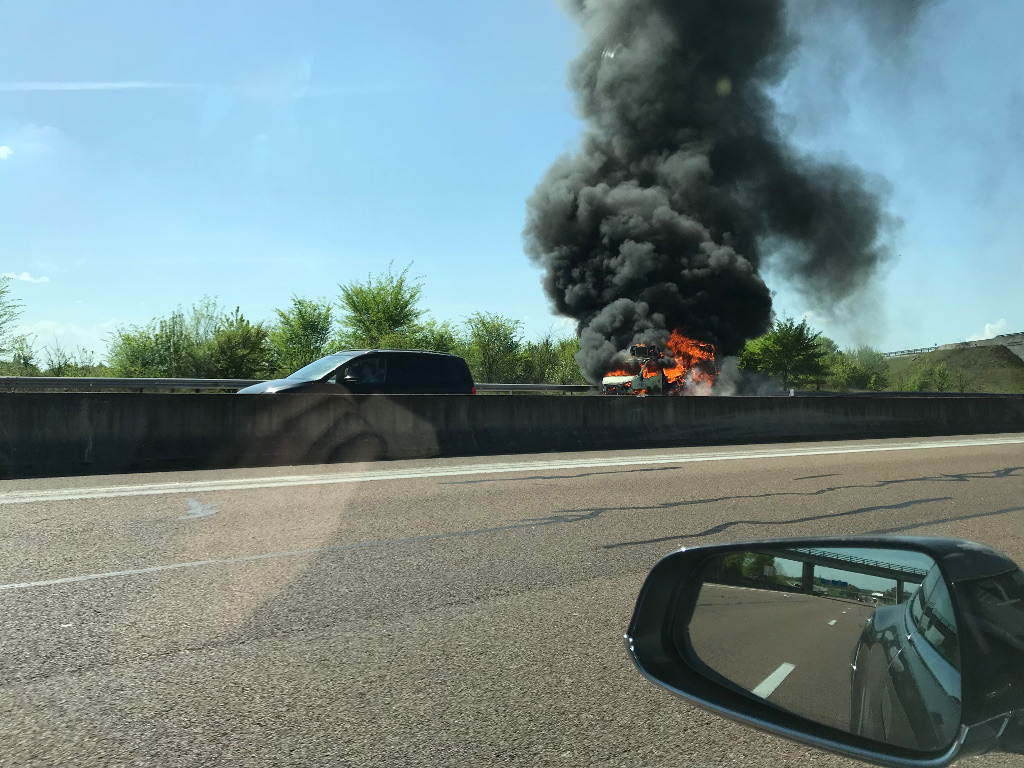
After my last publication about Tesla's car gained more views than any of the previous ones, and more than the outpouring of my soul in a cycle of 3 articles about creating an iPhone game, I felt obliged to publish a report on how we the family went on the cheapest Tesla model available at the moment (I consider Model 3 to be inaccessible, because you simply can not come to the Tesla salon and buy it) to the south of France and back. The total mileage was slightly less than 2 thousand km.
Go?
The cheapest Tesla model currently available is the Model S with a battery of 75 kW (h). According to the manufacturer of this capacity is enough to cover a distance of 490 km. In real life - a little less than 400 km in favorable conditions. Despite the fact that it was my first long-distance trip on an electric car, there were no special alarms, we already had a decent ride in the city, and we also had short rides 100-150 km from the city. We have already met with the work of superchargers, and I must say that in the end the journey was even easier than with a car with an internal combustion engine.
We divided the road to Cannes into 2 parts, approximately 400-450 km each. The first part: Paris - Lyon. We left Paris in a practically fully charged car (it was about 90% of the charge) at 7 am. The children slept in the car. Tesla's navigator offered us to recharge after 170 km in the town of Auxerre, to which we gladly agreed, because by that time the children had long been awake and started asking for a walk, and it would be nice to have breakfast. Supercharger was on the hotel, not far from the main highway. Having read different things on the Internet, at first I drove slowly, at around 115 km / h, and on arrival there was more energy than planned. The car offered to charge 15 minutes and go on. This did not suit us, since we decided to have breakfast at the hotel and I removed the charging limit so that the battery is 100% charged.
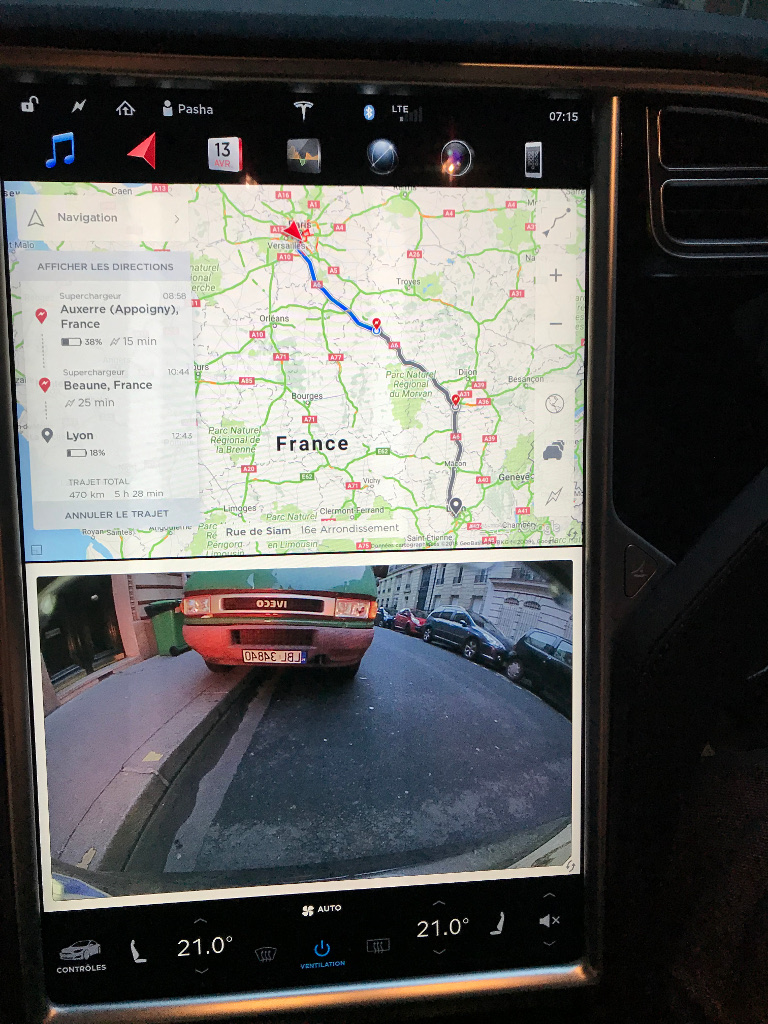
After about 30 minutes, at the height of breakfast, the phone informed me that charging is over, and I have to release the supercharger, otherwise I will pay 35 eurocents for each minute of the unreasonable supercharger. This I have not heard before. I re-parked the car and returned to the restaurant. Why do I focus on this? Because I thought before the trip that we would wait on charges while the car was charging. But in the end, the charged car waited until we decide to go further. Every time it was.
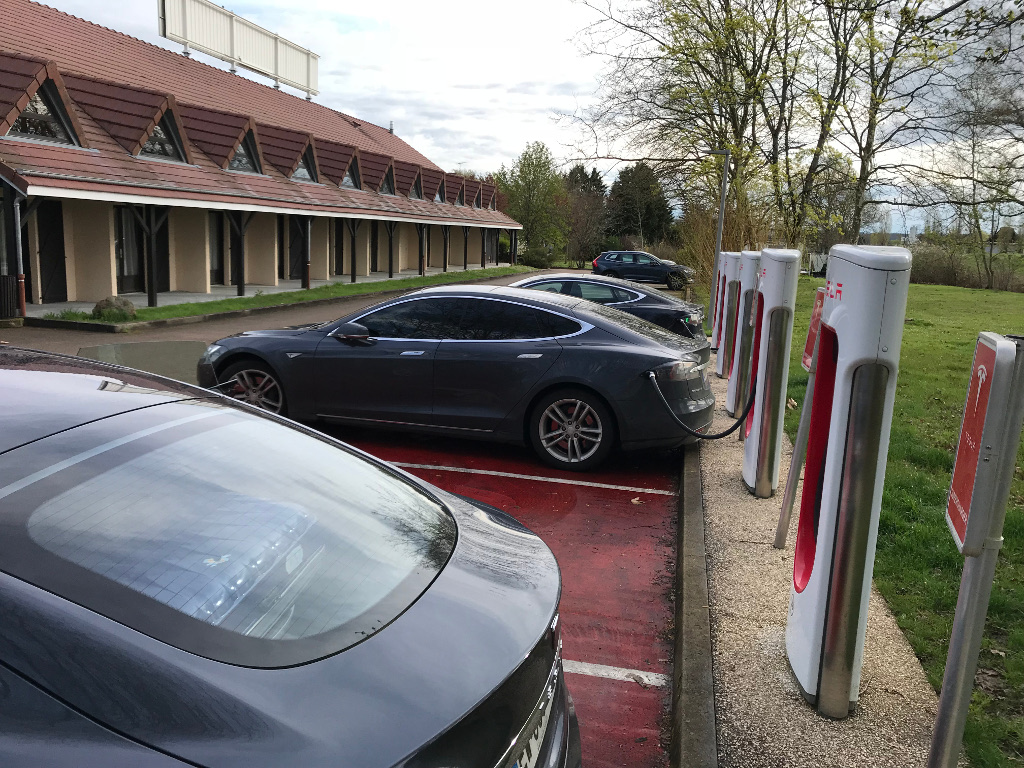
We now had enough charge to Lyon, but, since, firstly, we were not sure that we could easily find a charge in Lyon, and we wanted more stock, and, secondly, we wanted to have dinner early and even walk the children, we stopped at another supercharger after about 150 km of journey, having more than 60% of the charge in the battery.
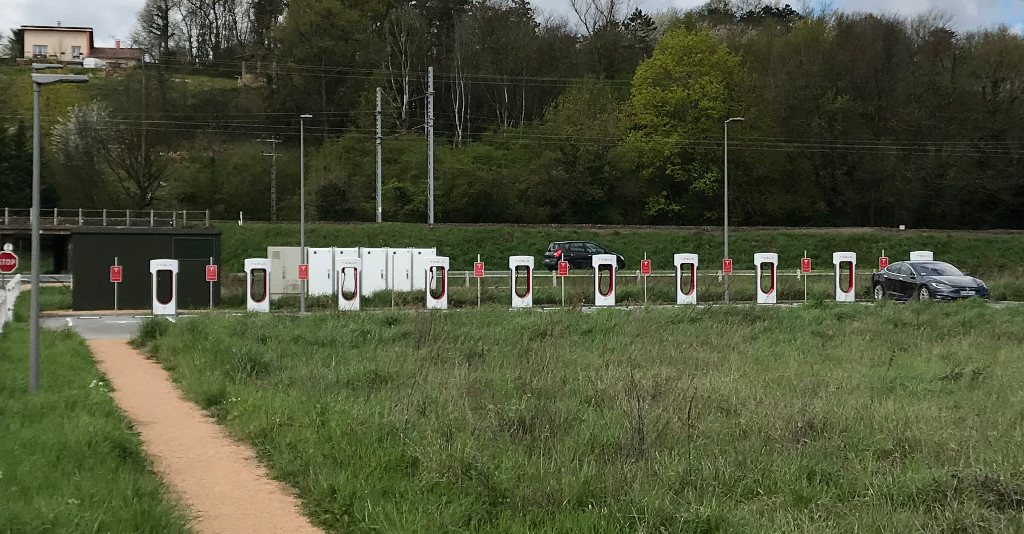
And in a hotel in Lyon, there was also a charge in the parking lot. Looking ahead, I will say that in both hotels in which we stayed, there were wall charger from Tesla. The impression was made that either Tesla subsidizes them to hotels, or simply does not travel on other electric vehicles (more on this later).
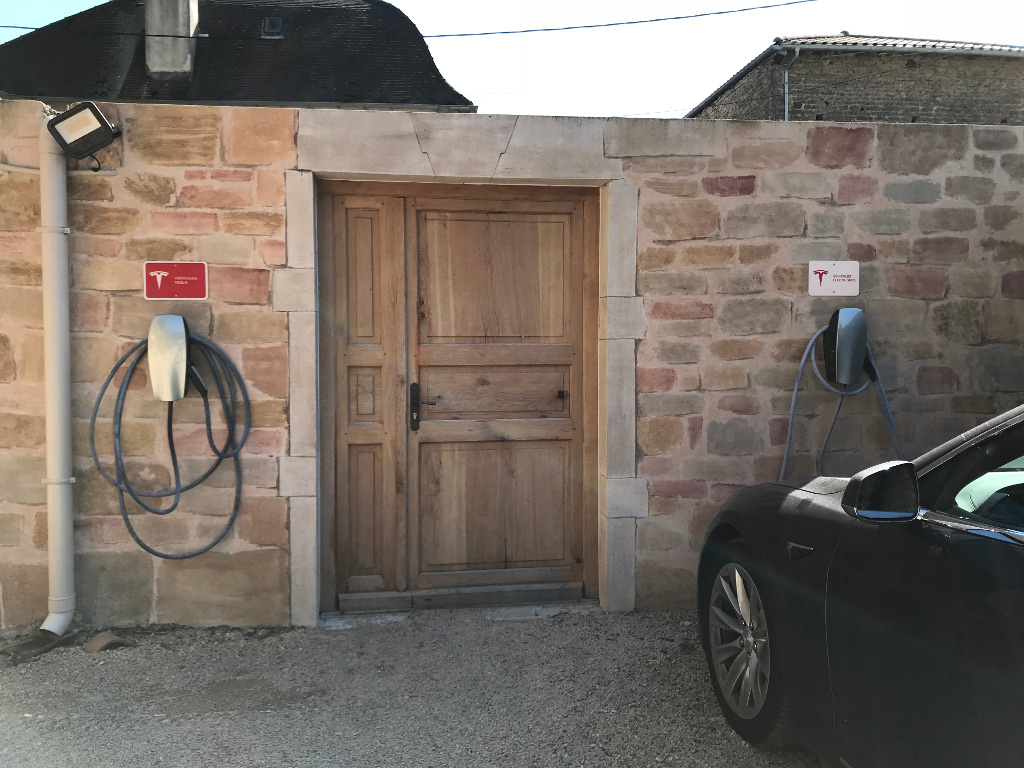
When we left Lyon the next day, we were already well aware of the autonomy of the car, so instead of 2 on the road, we decided to call only on one in the city of Orange, about 210 km from Lyon. Charging was located next to a huge shopping center, with a bunch of restaurants and a playground. After lunch there, we went straight to Cannes, breaking 250 km without recharging. Upon arrival in Cannes, about 35% of the charge remained in the battery, quite a good margin! So, on the way there, we made 4 charges out of 5 recommended and 3 necessary, while I was driving very calmly, at a speed of 110-120 km / h.
To charge on the spot was also not a problem, the car saw a decent amount of charge.
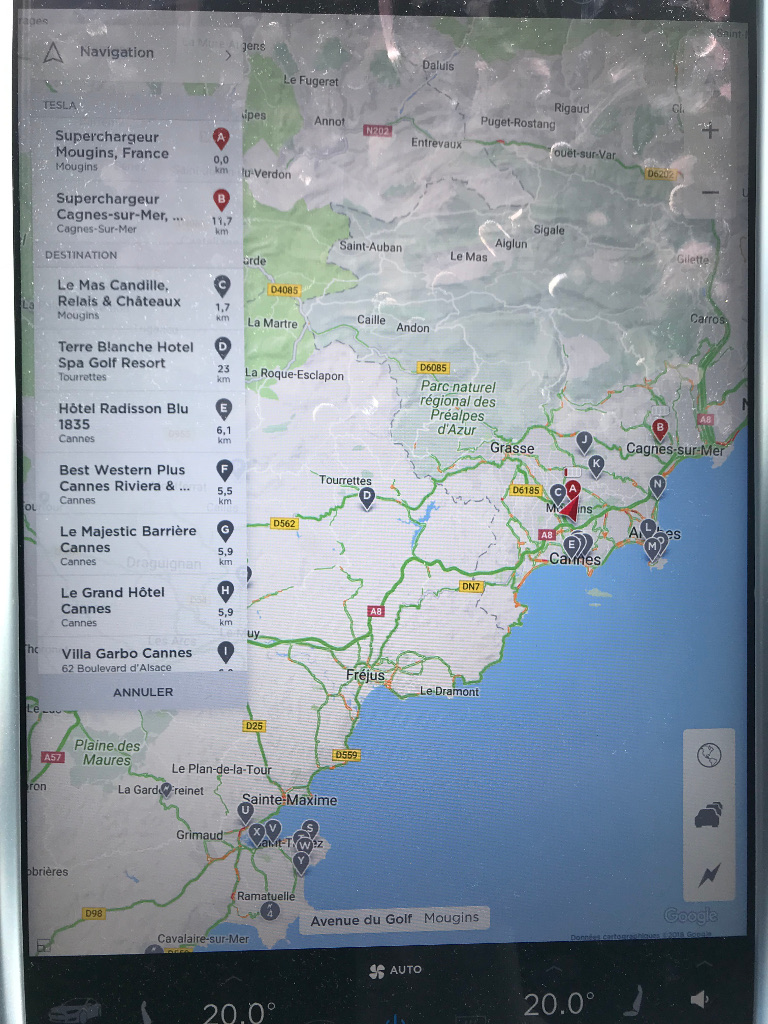
Back we drove without embarrassment, 130-140 km / h, driving out of Cannes with a charge of about 50%, which allowed us to get to the supercharger 150 kilometers with a small power reserve.
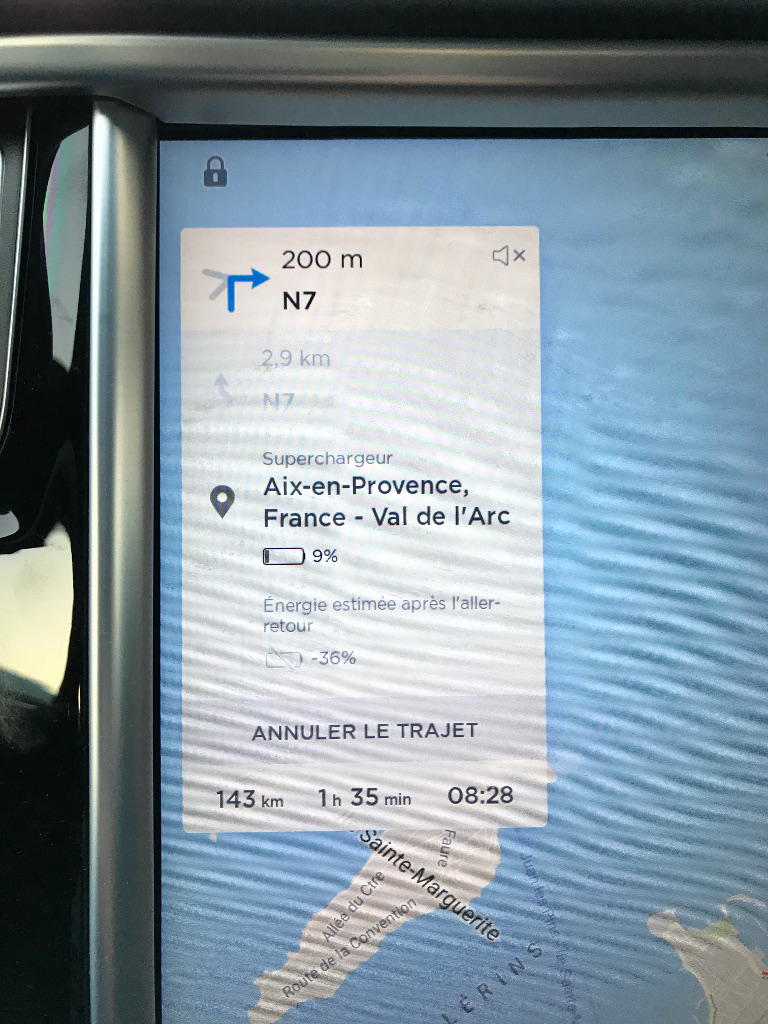
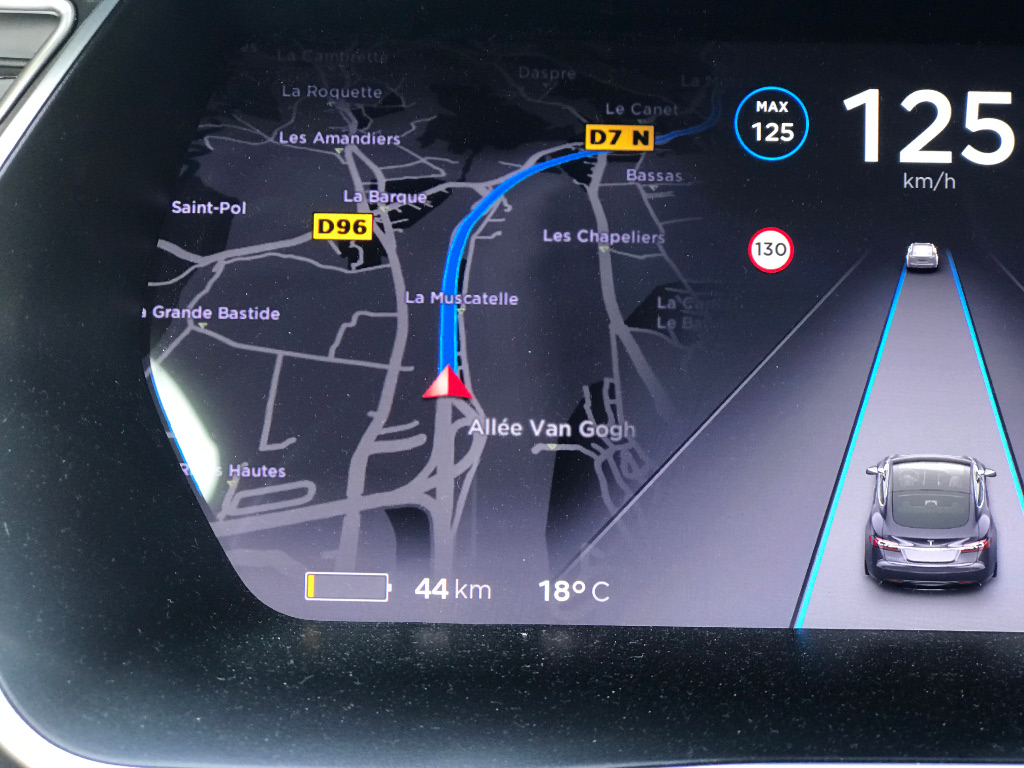
and met three charges with a margin, arriving in Paris with 55% of the charge in the battery.
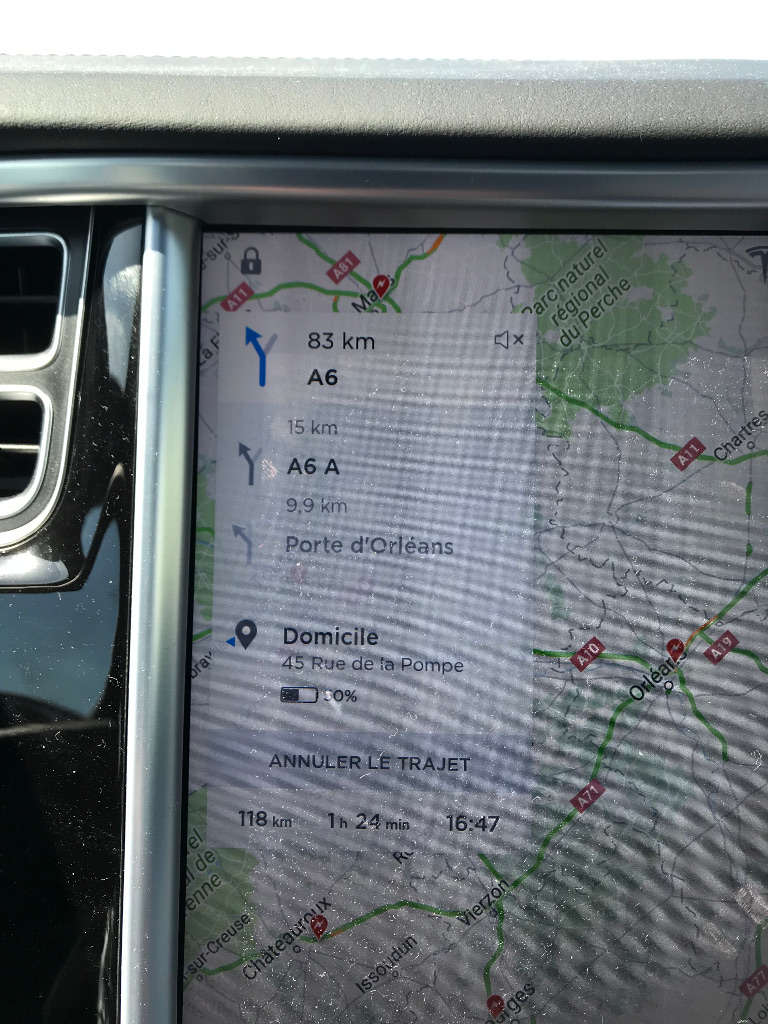
But probably one of the most talked about topics related to Tesla cars is the
autopilot . During the trip, I used it almost constantly, and the first thing I want to say: I do not understand how people can trust the management of the car to this thing. Moreover, I do not understand how you can entrust him with the control of the machine at high speed, how you can sleep in the car, which is controlled by the autopilot, or do other things. And not so much because of the hypothetical danger. I kept the autopilot turned on almost always, but I didn’t appear to remove my hands from the steering wheel at a high (more than 30 km / h) speed of desire. There are several reasons. First, the autopilot disgusting passes high-speed arc. The car starts to turn late, clearly following the markup. The driver would start turning earlier. Because of this, the car turns sharper. There is an excessive rotational moment, which the machine adjusts by counter-steering. Which leads to the moment in the opposite direction, and, as a result, at a speed higher than 110 km / h, the car passes an arc in zig-zagami. The oscillations are small, the passengers practically do not notice them, but they irritated me very much at first, then I myself struggled with the autopilot on autopilot in each speed arc, quenching the steering wheel oscillations. Secondly, on a straight road, the car may decide that the truck in the next lane is traveling too close to your lane, and begin to slow down, stopping the flow from behind. If someone is built in front of the car from the right row to overtake, the car reacts very adequately, smoothing off speed, there was no desire to intervene in such cases, however, when the overtaker returned to the right row after the maneuver his maneuver, and I had to press the gas myself to start accelerating gradually and not to keep traffic behind. For the sake of justice, I must say that the autopilot has never created a dangerous situation, often, on the contrary, did everything too safely, but this thing did not inspire confidence in itself.
However, when the autopilot is turned on, it is morally safer to drive. If you suddenly gape, there is a chance that he will help. In my opinion, on long journeys it is important. And at the entrance to Lyon on the highway, we got into an impressive traffic jam. Traffic "dragged" at speeds of 0-30 km / h. In this situation, the autopilot is irreplaceable, it allows you to greatly weaken the attention, and you do not need to constantly slow down / accelerate and steer. But here the speed is quite low, and the price of the error is damage to the car. There are no traffic lights, no intersections, no pedestrians. Perfect. In the city, the autopilot is almost useless.
Superchargers Superchargers are awesome. After this trip, I can not imagine how you can buy another electric car if you plan to make long trips. Yes, in Europe there is a charge at almost every gas station, but they belong to different providers, and either you have a lot of season tickets for charging from different providers, or guest charging will not cost much humanely (about 20 euros for 30 kWh, on Tesla Model S it’s about 120-150 kilometers, which is pretty close to the price of combustible fuel). The speed of such charge is also not amazing. So, the supercharger charged the battery with a current of 95-100 kW. And he needed to work for 30-40 minutes for a working charge. Third-party charges produce a maximum of 33 kW. That is, it will take 2-3 times longer to fully charge, which is not very convenient. Superchargers are located in shopping centers and hotels, where there is something to do for an hour, I don’t know what to do for 2-3 hours at a gas station.
So, it is not enough for traditional automakers to make a decent electric car, it is necessary to make decent charging for it. Otherwise, the electric car is doomed to drive only in the city.
A few words about the car itself
The bundle of the cheapest Tesla is pretty “rich”. In addition to the expected for any modern car options, the car is equipped with a panoramic glass roof, air suspension, all-wheel drive, electric rear trunk lid, front seats with electric drive and memory. For me, some of these options are superfluous. So, for example, I perfectly could live without a panoramic roof and the electric trunk lid. Air suspension, although pleased with the opportunity to change the ground clearance, is also not a necessity for me. Electric seats and memory for me personally - a whim, in 5 seconds I will find "my" position on the mechanical seats. In the end, if I could choose, I would leave only the four-wheel drive, since on electric vehicles it not only improves handling on slippery surfaces, but also reduces energy consumption and increases the efficiency of recovery. And, interestingly, earlier Tesla allowed to refuse all these options, but now it cannot be done. According to the manufacturer, this is done to optimize the assembly of cars and reduce the average cost of the car. I do not know about the average, but if I could, I would refuse all these options and take a 100 kW (h) battery. But, alas, we have what we have.
And we have, in general, a very, very comfortable car. Yes, after Model X, Model C seems a bit ordinary. Neither the falcon wing doors, nor the front door drive, my favorite celebrity mod is unavailable, and the third row of seats, available as an option, is face-down in the trunk. But it is still a very comfortable car. I do not quite understand those who say that Tesla salon is terrible. In my opinion, he is very good. Even in the basic, "rag" version
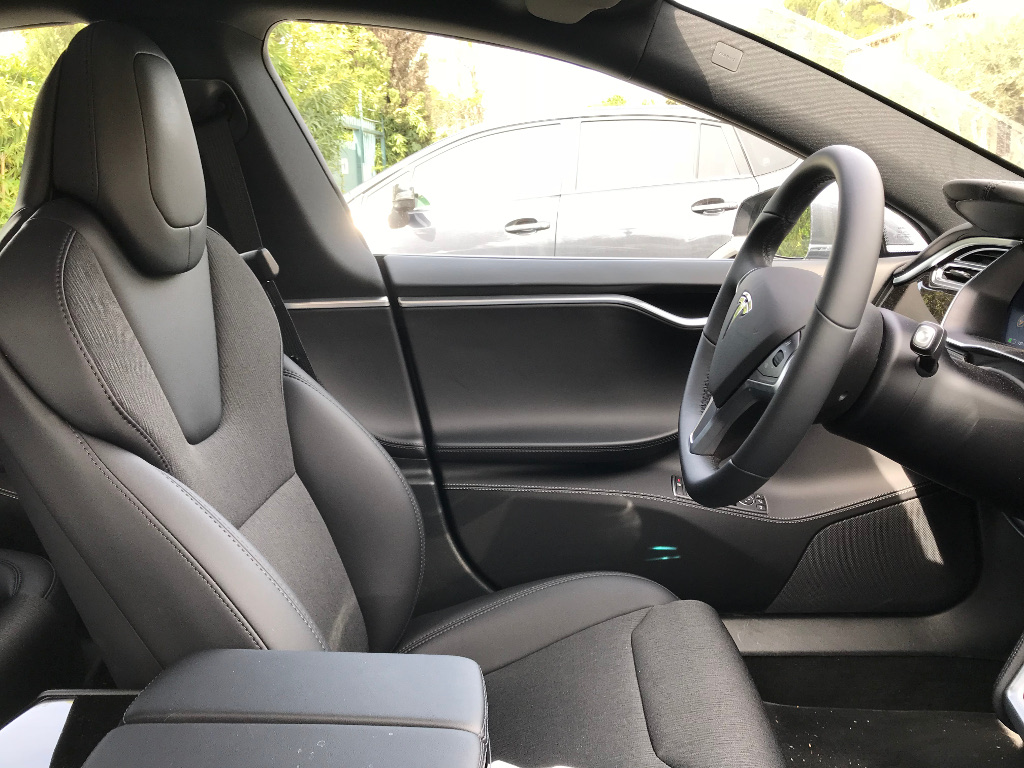
Yes, a little lacking pockets in the door, but this is perhaps the only thing you can find fault with in terms of equipping the cabin itself. If you choose a salon entirely of leatherette, the ceiling will be covered with Alcantara, as well as part of the front dashboard. But, in my opinion, and so is quite a nothing.
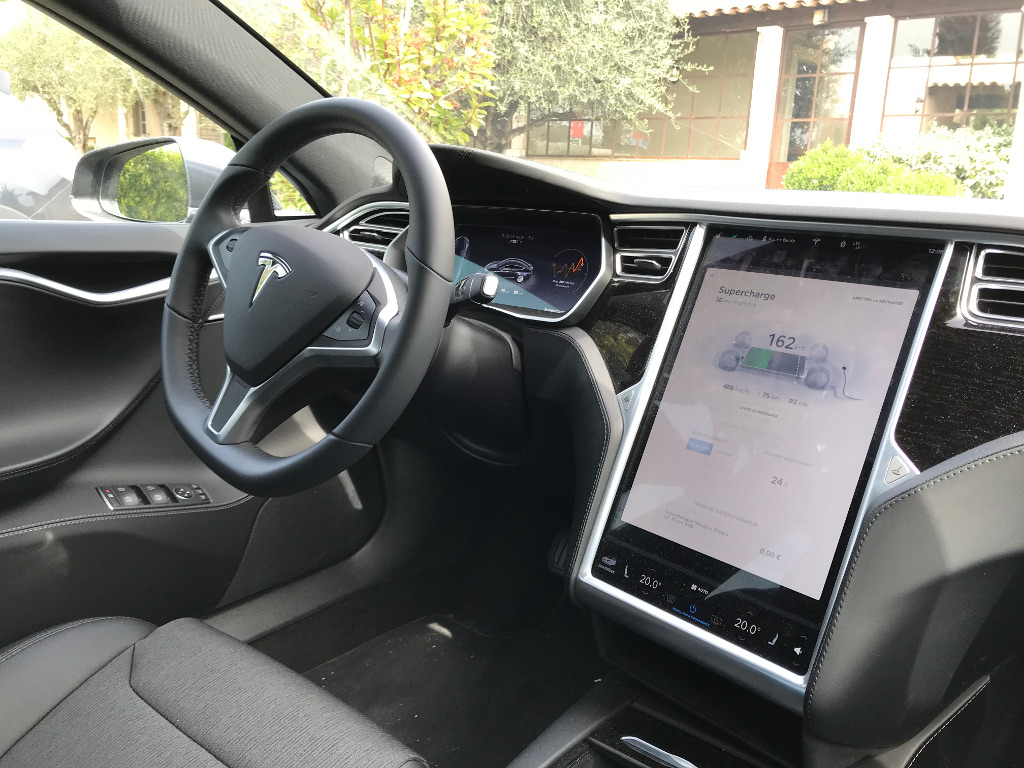
No real leather in the options there - it is "not environmentally friendly."
Of course, there is nothing to complain about, but this concerns more build quality than the concept of the salon itself, or the choice of materials. For example, in our car, the upholstery of the front doors does not match in height, the left door is adjacent to the dashboard exactly, and the right one is slightly higher, but this is not critical, I had a similar problem in the Audi A6. Worse, the right front door seal bristles at the bend, which I have never seen before. But, again, this is my first American car. Perhaps they have so accepted.
Ergonomically, after 2 thousand km, I can say one thing. Those who criticized the touchscreen controls in my previous Tesla review were right.
Climate control is not convenient. Totally. No matter on the go or in the parking lot. I want to "cool". At the worst - buttons. But alas. But everything is very cool with space for luggage. And the chairs are very comfortable, they do not get tired of the long road. And due to the completely flat floor, it is more convenient to sit in the back of the third passenger (although the back sofa itself is not particularly comfortable), or you can throw the “extra” bag on the floor.
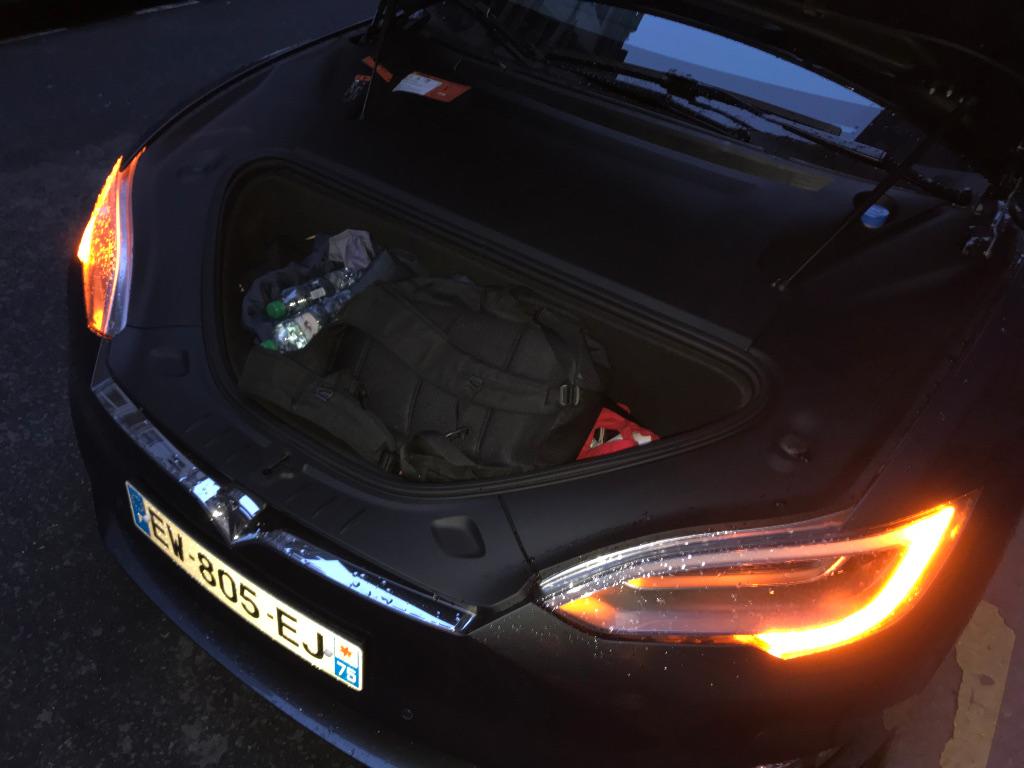
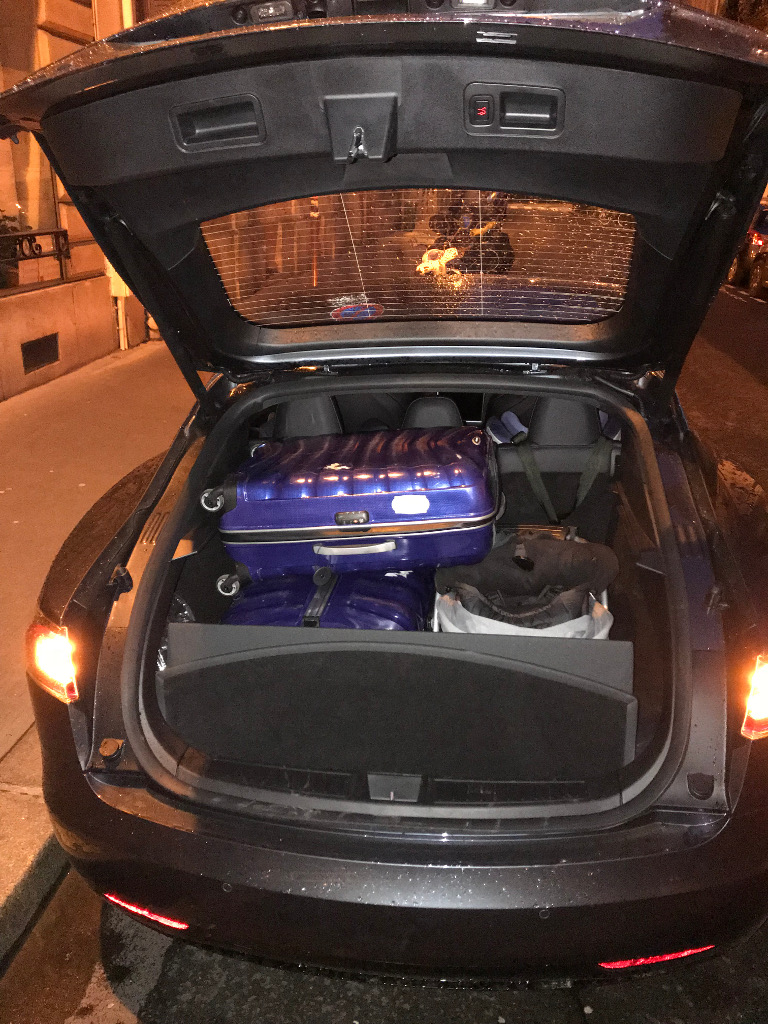
In general, the car is almost perfect for long trips. Of course, subject to the availability of infrastructure.
PS: On the way, we saw 2 car fires. Both times - cars with ICE.
